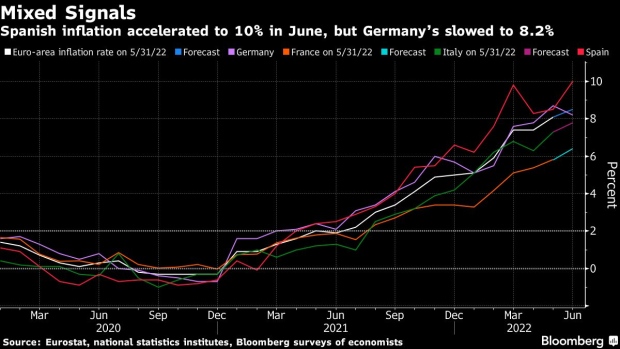Jun 29, 2022
German Inflation Eases on Temporary Government Relief Measures
, Bloomberg News

(Bloomberg) -- German inflation unexpectedly eased as temporary government relief measures reduced pressure on households and businesses that have been squeezed by a record surge in prices.
Lower fuel taxes and discounted public-transport costs helped slow consumer-price growth to 8.2% in June from 8.7% in May, data released Wednesday showed. Analysts surveyed by Bloomberg had estimated an advance to 8.8%.
While providing some respite for Germany itself, the reading won’t sway the European Central Bank from lifting interest rates for the first time in more than a decade next month. Inflation pressure remains intense elsewhere in the 19-member euro zone: Spain earlier reported a surprise jump to an all-time high of 10%, defying politicians’ efforts to curb it.
ECB officials meeting at their annual policy retreat in Portugal are united behind the plan to kick off a series of rate hikes starting in July, with some in the Baltic region -- where inflation tops 20% -- encouraging larger-than-planned moves be considered to bring price growth back toward the 2% target.
Germany’s slowdown could extend into next month, when a renewable-energy charge on electricity prices is abolished, but underlying price pressures are likely to stay elevated, according to Berenberg economist Salomon Fiedler.
Governing Council member Pierre Wunsch warned Wednesday in an interview that the ECB may need to raise rates by more than it wants if inflation prompts governments to spend ever-increasing amounts on shielding households.
That suggests that measures such as those in Germany -- which have temporarily eased prices -- could end up having undesired consequences down the line.
©2022 Bloomberg L.P.






